
A lot of time, the reason it’s a challenge for schools to be junk free is that the alternative plan is not workable for the parents, because parents would give excuses that their life is full already. The truth is parents are still in the process of learning but as much as they are busy, they still need to make healthy eating choices for their family and be committed to it. Not every parent is there yet. It’s possible to eliminate junk completely but the school community must work with the parent community to make sure that the alternative is workable. – Theodora Ayeni
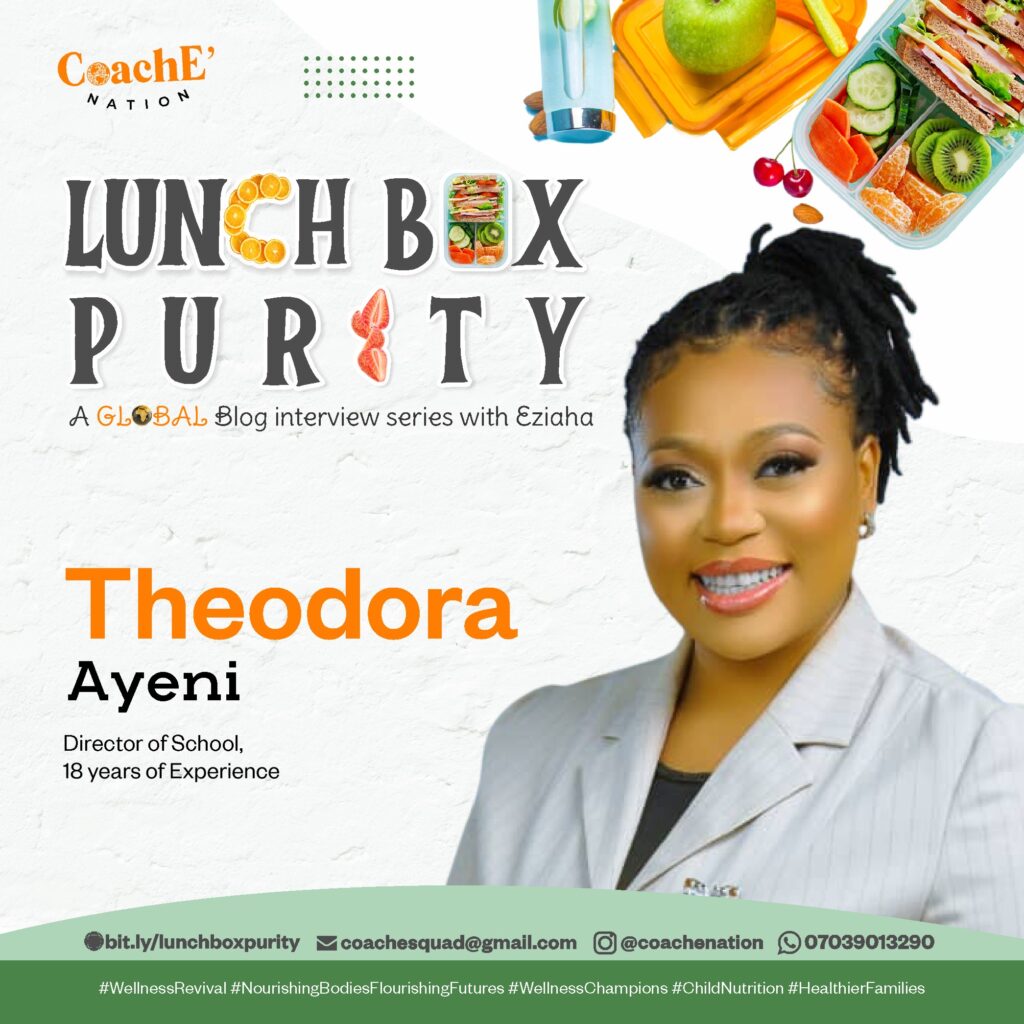
- Please tell us your name, where you currently teach, years on the job and how you got into the beautiful world of education
Answer
My name is Theodora Ayeni. I am currently serving as the Director of school at Eldoray the Children’s house. I’ve been a teacher for 18 years. My journey to the world of Education was inspired by my SS1 teacher who taught me Government at the time. Miss Viola although late now was such an example to me in many ways and all I wanted was to be a teacher like her. However, before then I wanted to save the world, go around and teach people things that will make the world better. After my encounter with Miss Viola in school, I thought she does everything I’d love to be. At the time I was in SS3, WAEC and JAMB came and I choose Social Studies Education in my JAMB form. Fortunately for me, I got admitted into the Federal College of Education to study Social Studies Education. That was how my journey started. But the diversion into Early years came in my second year in school. I took a course, and the lecturer told us about very famous Educationists and some of their works. One of the Educationists spoken about was Dr. Maria Montessori and as I listened to all the work she did with young children, I thought within me that this woman must be a genius. Right after I finished my Social Studies Education programme, I went on to take Early childhood course and Montessori training for age 0-3 at MCI London. That was the beginning of this journey into Early years education that I have gone through this past 18 years. I’ve worked with various schools within and outside of Nigeria. My dad had given me one condition, because at the time he said to me “oh I think you’re too intelligent and too smart to just want to be a teacher so you better make sure you’re the best”. That motivated me to take my career really seriously and through all the years I evolved from Class Teacher to Sectional Leader to School Supervisor to Head of School and then 17 years after I thought to have my own little children’s house. That’s how I got to where I am now as the Director of Schools for Eldoray Children’s House. We are an early childhood center that deals with children within the ages of 3 months to 6 years. We share with them all the love and all the learning that they need for this stage. That’s my nice summary of how I got into the world of education and it has been amazingly beautiful all the while.
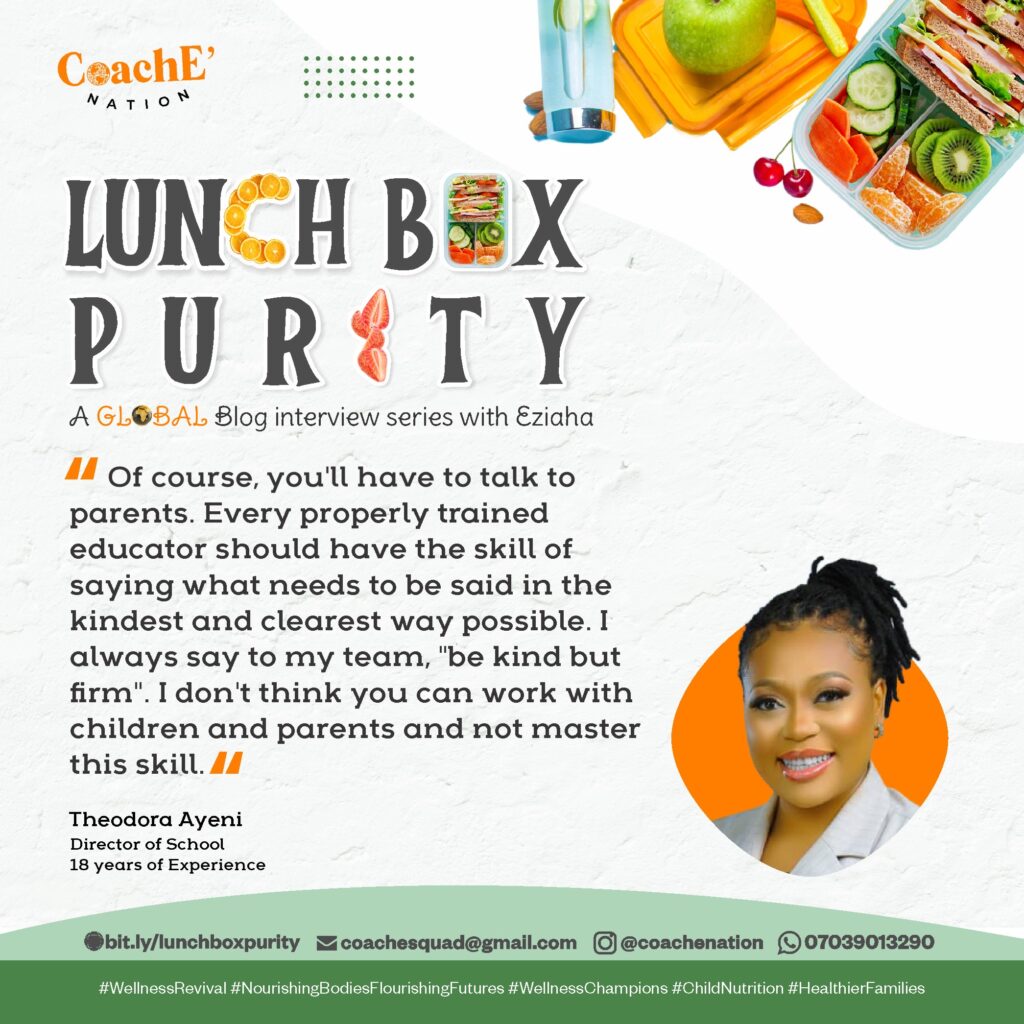
2. Your most significant/memorable experience as an Educator?
Answer
My most exciting experience will be when I got my first International teaching job. It was such a big deal for me. I have a lot of them but for me that was the biggest deal because it opened the door to many other opportunities. Through my 18 years so many things have happened but that one meant a lot to me. Firstly, I schooled in Zaria, which is far away in northern Nigeria in Kaduna. It’s 2 hours drive from Kaduna state. So to go from a girl who read Social Studies Education in Zaria, who was living in Nigeria, teaching in a school in Abuja, Nigeria and now to an International school in Kaduna was huge.
In fact , the school where I was working at the time was owned by an older colleague who had also graduated from MCI Kuwait and she had her school in Abuja. She knew I was an MCI student from MCI London. It was such a privilege to work with her. I was working there when I got the job in Accra and I was really surprised. The whole process of preparing my work permit was intriguing, I didn’t know a teaching job could take me outside my country. It felt so nice traveling as an expatriate teacher. It elevated my mindset to a different pedestal in my career. That was the beginning of many more amazing opportunities for me. It opened me up to international best practices and cultural diversity and I have experienced many great opportunities after that. It’s an experience I’ll always refer to.
3. Is it actually possible for a school to eliminate completely junk in the lunch box of our children as opposed to having a few days a week where junk is not allowed? If no, why?
Answer
Yes, it’s possible to eliminate junk food and it’s very necessary for the holistic wellbeing of children. However, I believe that rather than just tell the parents not to give their children a lot of things, one way to completely eliminate junk will be to work with our parent community to create a workable alternative. This is because in real life situations not every parent has enough discipline and time to do so. So for us at Eldoray Children’s House what we do is this, we’ve told them no sweets, no snacks, no fizzy drinks and no icing on the cake if you must have birthday cake. We have all those rules in place but to make it actually workable and not end up as school policy in the parents handbook, we set up a kitchen.
We have a kitchen that has kitchen equipments. So we tell the parents to bring what their child likes to eat and we’ll make it in school. If your child wants to have a banana smoothie, bring the banana, we’ll make it in school. Does that mean extra work for the minders? Yes! But we have a minder who is assigned that job so it’s more workable for the parents. So there’s no excuse for work or electricity being the reason you feed your children anything. We tell them to bring it. But we don’t allow some foods that will take hours to make. We have mothers who bring their stew and we just steam the potatoes for the child. We had to find a system that would work to keep that rule.
A lot of time, the reason why it’s a challenge for schools to be junk free is that the alternative plan is not workable for the parents, because parents would give excuses that their life is full already. The truth is parents are still in the process of learning, but as much as they are busy they still need to make healthy eating a choice they want to make for their family and be committed to it. Not every parent is there yet. It’s possible to eliminate it completely but the school community must work with the parent community to make sure that the alternative is workable. For us this worked well, telling them to bring what you want them to eat and making it in school.
We are an Early childhood school, we have 3 months old to 6 year old so we can always fix that. But for people who have older children they may need to explore more alternatives. I have a son in year 4 and he’s on school lunch plan. What they do is they have a time table and they let us see the timetable to be sure that it aligns with what we want our children to eat and then your child eats. So every school can create something that work. It is possible if we put in the work and we commit to it knowing the benefit that it has for our children and for their brains.
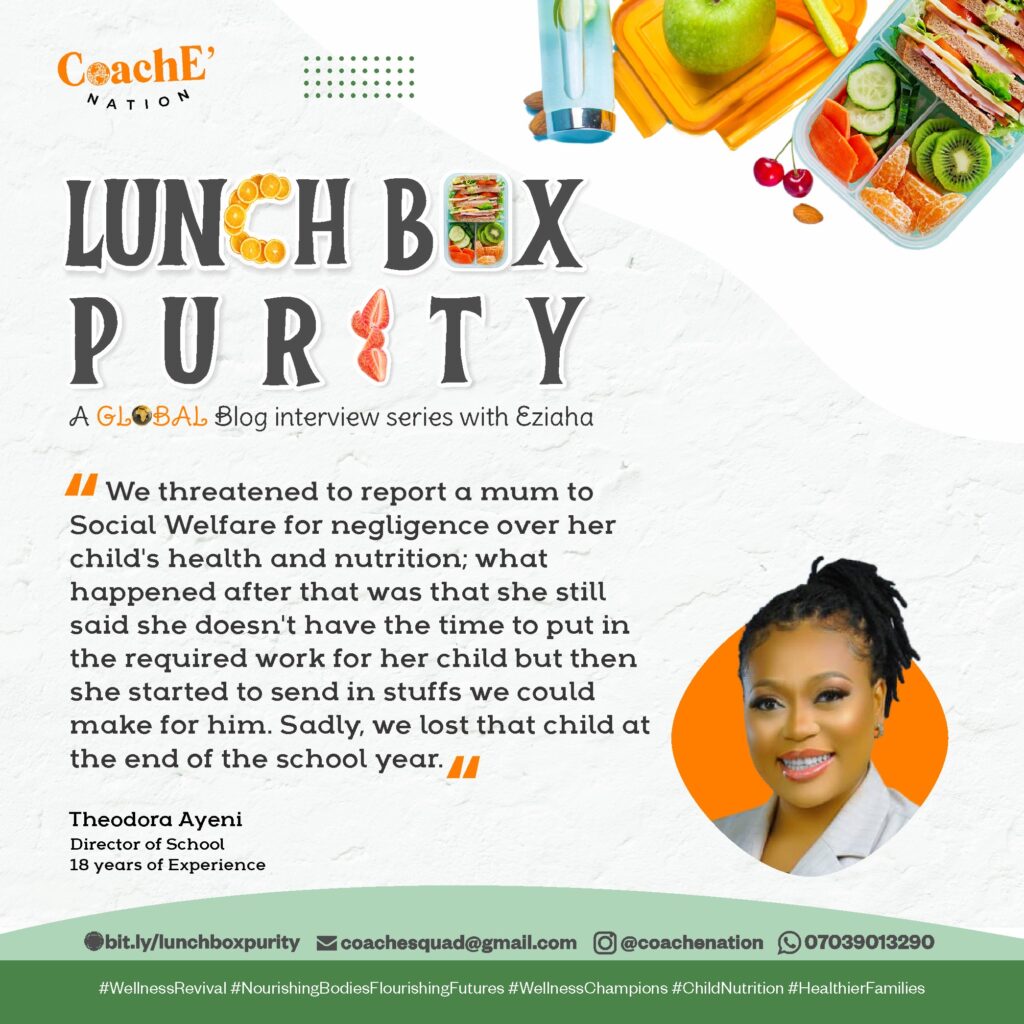
4. Are there times when an Educator (you or someone else) has had to intervene per the content of a child’s lunch box, especially when you can see that the frequency and volume can negatively impact on the child’s health both short term and especially long term? If yes, how did that go and/or how can an Educator help/intervene without coming across as being judgmental? How do we educate that child and/or the parent into better and healthier decisions?
Answer
Of course you’ll have to talk to parents and sometimes it will not sound nice. The first thing I want to say is every properly trained educator should by virtue of their training have the skill of saying everything that they need to say in the kindest way possible and in a very clear way. I always say to my team you’ll be kind but firm. I don’t think you can work with children and parents and not master that skill .
Now that I have cleared that, there are several instances we’ve had a challenge of the parents not being on the meal plan and they are not bringing food for us to make for their child in school. They had the liberty to bring their own food but they are not bringing the right thing. One notable one would be, last school year we had a special need boy and as with most special needs children they have foods that are medically recommended for them to eat and food they should not eat. Then I noticed that his lunchbox has the kind of things that he shouldn’t even be eating at all because his brain cannot handle it. We spoke the first time, the second time and so the third time I told the mum, if you don’t have the time you can bring this food we can make it for him here. She always had an excuse.
What we do when we register children at my school is to make the parents submit the photocopy of your national ID card, either their passport data page or something else. So I said to her you know I have your details, if you don’t do something about this I’m going to report you to the Social Welfare because that’s the body responsible for most early child cases (I call it nice teacher’s threat). That you know that something is wrong with your child and yet you are not willing to put in the work. What happened after that was that she still insisted she didn’t have the time but then she could now send in food we could make for him. Of course we lost that child at the end of the school year because I guess she didn’t want us harassing her. You have to choose sometimes and that’s the hard part of being a school. You know what is good and important for these children and sometimes you use your kind words but very firm words. The parents may say you are intruding too much. Some people just bumped into parenting and were not ready to be parents but I’m not going to speak about that since that’s not what this conversation is all about.
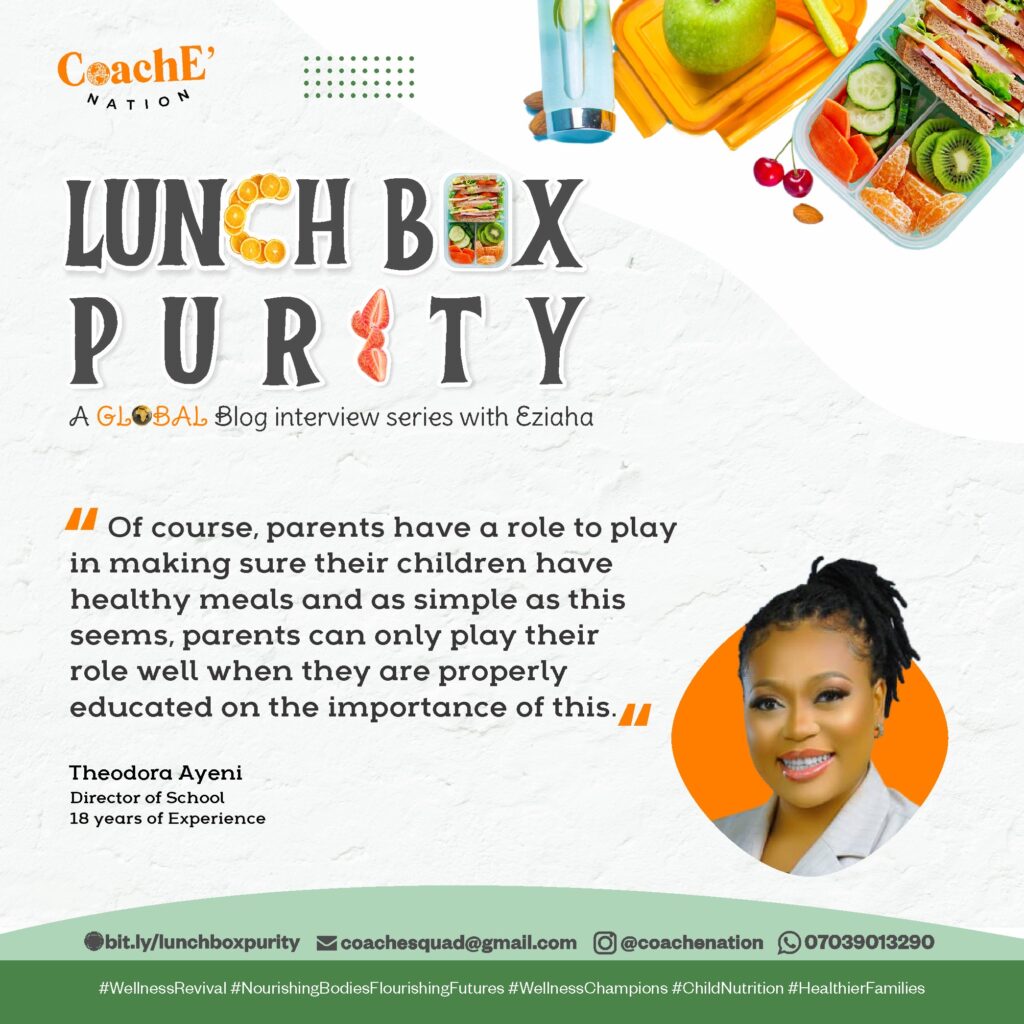
5. What role can parents play in supporting your efforts to promote healthy eating? How best should we communicate with parents about the importance of nutritious lunches? Do you have any practical success stories on this?
Answer
Parents have a role to play in making sure their children have healthy meals and as simple as it is, parents can only play their role well when they are educated as to the importance. The parents have to provide healthier snacks or sign up for a school lunch program that is healthy. If you are in a school like ours, send in healthy food to be prepared for your child but parents can only play their role when they are properly educated. I am a school leader and this blog is open to everyone I will say parents need a lot of educating.
These days we are lucky to have a lot of parenting training going on across the globe on different platforms but we need to be deliberate to educate parents as to the benefit of healthy eating for their children like the physical benefits, intellectual benefits and mental stamina that can come from eating the right food. We need to talk to the parents more when we have parents forums. In newsletters we should add it to the things we talk about, not just Curriculum, Math, English and Science or school fees. We should educate the parents so that they can commit to making the right decision of simply buying the right things and planning in advance. One thing that would help parents is if they have the right education then they will understand why they have to plan school meals in advance. But if you tell them you have a role to play, feed them healthy food their response will be that at home they give them healthy food but in the morning they don’t have the time. They must understand that it follows through and just like you plan for the home, you plan for the school meals ahead as well. We need to keep reminding parents of their role and giving them the tools because if you tell someone his role as a parent and why he should provide healthy food but you don’t show him how, he now knows what to do but he doesn’t know how. Let’s give them the tools, show them how to plan school meals but if they can’t plan school meal and they are in schools where they have already set school meals plans that are healthy, they should align with it and take advantage of it.
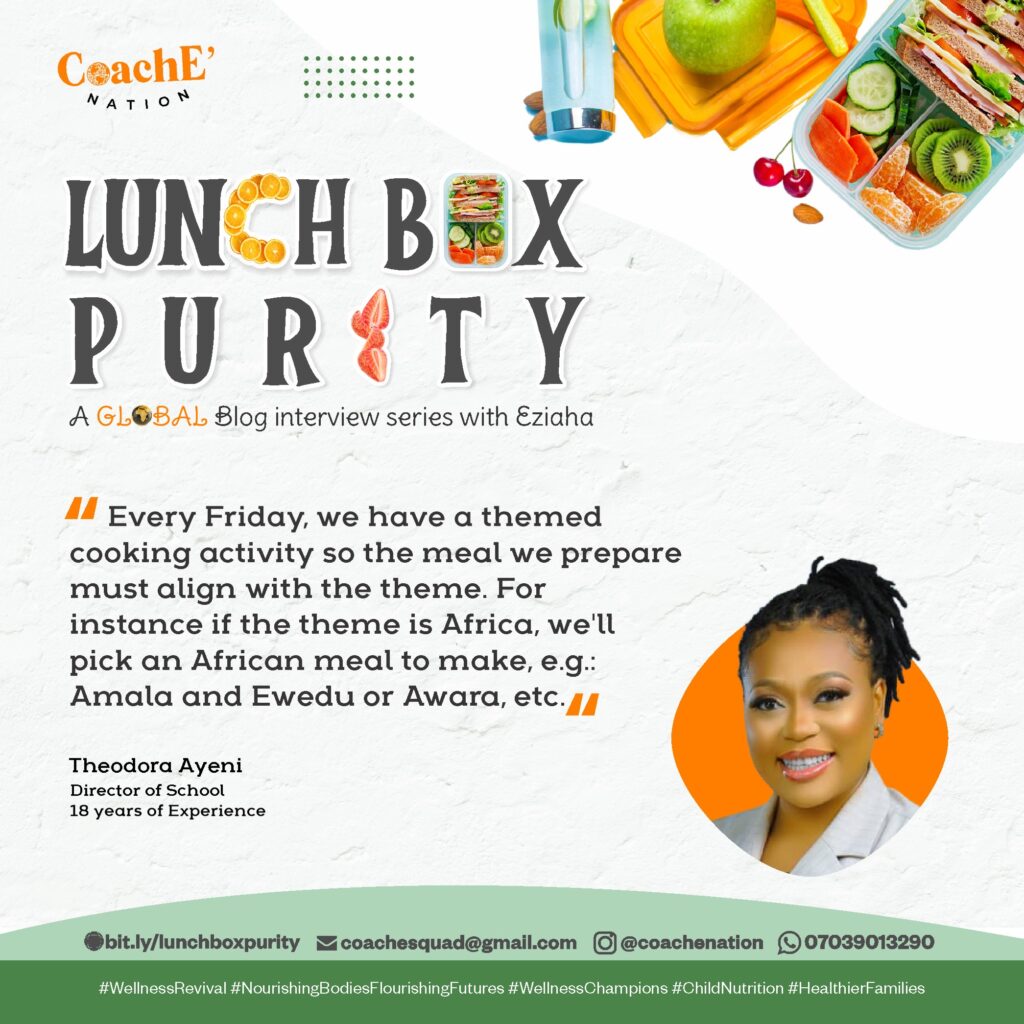
6. Are there ways you have successfully incorporated Nutrition education into your curriculum? Can you share any successful strategies you’ve used to make nutrition education engaging for children? This really speaks to it being incorporated into the learning curriculum as opposed to scheduled events.
Answer
Of course we do, we don’t call it a nutrition class, we call it a cookery activity. Every Friday we have a cooking activity. We have a theme so we have a meal that aligns with the theme. Let’s say we are doing Africa. We pick an African meal that we want to make e.g Amala and Ewedu or Awara. We pick a meal and teach the children about why we need to eat this. If it’s Zogale they call it in the north that is moringa leaves, peanut powder (Kuli Kuli) with some tomatoes, so we pick a meal that aligns with our theme and then we make it with the children. We go through the process of making it, we talk about, what we are using to make it and what it does in our body so that they get all excited while they are learning about it. When we finish making it we eat it.
Now, what this has done is that it expands their taste, their food adventure or their thirst for food because some of the things we expose them to are new food that they may never have eaten at all. Like the Zogale- Zogale is the northern word I don’t know if it’s Hausa but it’s a northern word for moringa leaf. To make it you use moringa leaf which is Zogale, tomatoes and kuli kuli powder (grounded peanut powder). We do those kind of food using things that are available to us in our local community so they are learning about this food and they are learning what the food does to us and we get to taste it and know the effect.
This makes them more willing to try different foods even at home because some of the parents will be really surprised they ate it. It has also helped our parents to see alternatives. The child won’t eat cabbage but the child would eat Moringa leaves because it’s lighter and yummier with the kulikuli or the cucumber and the tomato. A parent might say, I put lettuce and she didn’t have it and I’ll say, try cucumber and tomatoes. So we are trying things like fish and onions, different things because every term has at least 12 weeks so we explore lots of different foods and what that has done is to help the parent at home to be willing to explore healthy foods and we are absolutely loving it.
7. If your school gives the children lunch in school, whether optional or compulsory, how do you take kids with special dietary conditions into consideration, ensuring that they are also all-round well-nourished?
Answer
What we do to make sure that every child’s nutritional needs are covered is, upon registration, we ask for an allergy list, especially food allergies. Some kids don’t have okro, some kids don’t have eggs, some kids can’t even be around eggs. So we ask for an allergy list, we have an allergy list for all the kids.
We have a few special needs children, we request for the entire medical history of that child and with specific emphasis to what did the doctor say your child can eat and cannot eat and we’ve had instances where we have to double check with our special needs partner and we’ve had instances we’ve had to double check with the hospitals so that when we are doing the cookery activities or we are preparing meals at school we are not compromising anybody’s health safety in terms of allergic reaction or deficiency as to the nutrients that they need. I remember having a special needs boy who had to eat a lot more beans than every other child would typically eat. His meals will include things like moimoi, boiled beans, bean soup and many others so we try to make those considerations, sometimes it comes at an extra fee, sometimes depending on the need or uniqueness we just let it slide as with everybody.
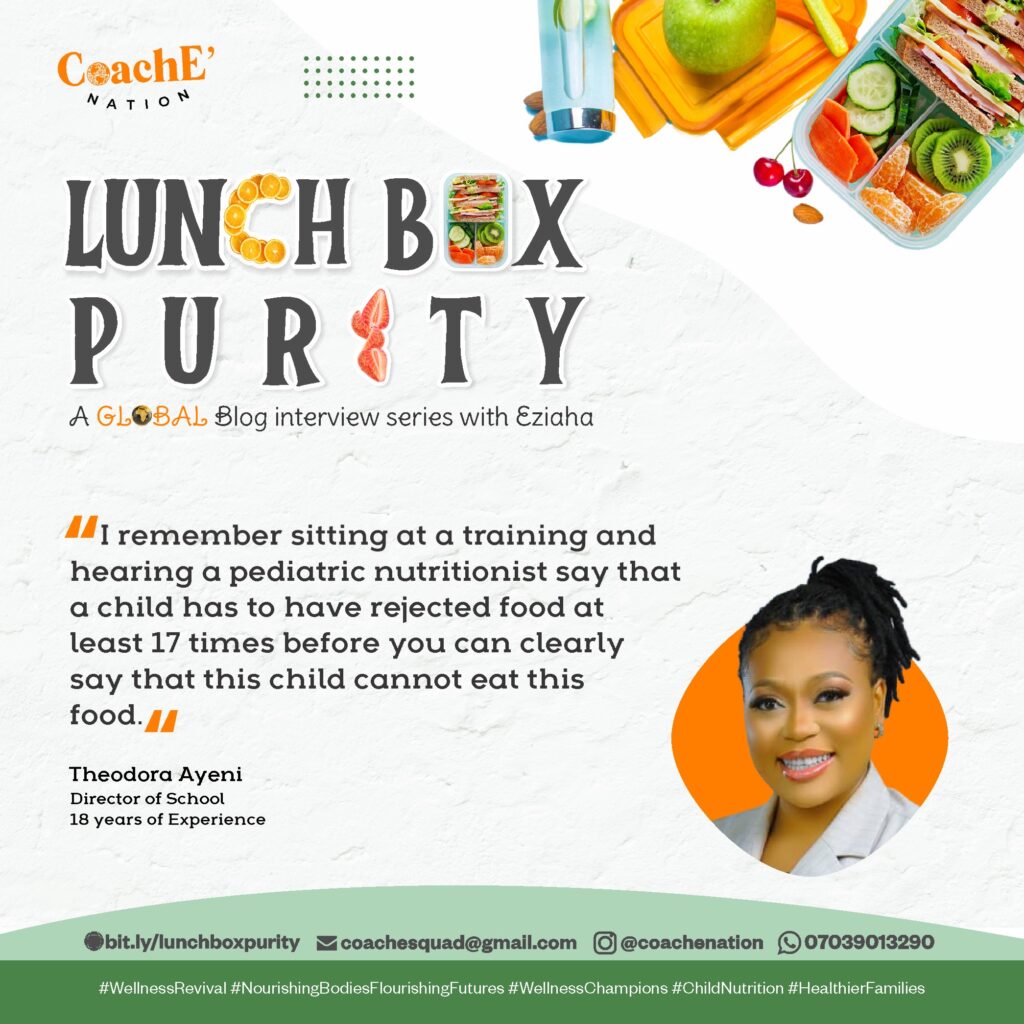
8. Your Turn/Last words.
Answer
In conclusion what I will say would be parents and educators must understand the importance of this and work with the experts because depending on what field of education you specialize in, while you may know on a general level, the importance of healthy eating you may not have all of this skills and tools that you can use to empower parents to make better decisions , so it is important that educators know what is important and why it is important. Know where their limits are as to how they can advise.
I remember sitting at a training and hearing a pediatric nutritionist saying a child has to have rejected food at least 17 times before you can clearly say this child cannot eat this food before then I was one educationist who always say if they say no to you don’t worry just try another thing and then I realize oh! Theodora you can’t say try another thing after I heard that. So educators must know this is not my field. Yes, I am the teacher. Yes, I know a lot about why healthy eating is important but align with experts who are nutritionists who know these things and then take good counsels so that you can give your parent community relevant information. The parents must also learn to trust that every decision that the school is making is for the best interest of your child except the school has proven otherwise. And this is why parents should do some research and talk to the school. You shouldn’t have your child in a school where you cannot have conversations with the school leadership on some level. So, talk to the school some schools have meal plan but even the meal plan are not healthy! Talk to the school, talk at the parents forum. We need to understand that the parents and the teacher, the parents and the school is a partnership to raise another generation. Until we start to see it like that we can’t do much together.
When you have a school community where the interaction is solely business, then we don’t understand the generational impact that we can make when we partner. So my charge or my closing message would be parents and the school need to come together and understand that this is a generational reform that we are trying to achieve and so this is what I know, this is what you know. This is the nutritionist or the food expert or the social needs expert who can give us some more information, and let’s all come together in alliance and raise children who eat better so that their brains can function better. So that they are healthy, so they are not sleeping in the first one hour at school, they are not sleeping right after break time because they’ve had juice, biscuits, bread and all the things that make the first period after break look like it’s sleeping time. So they are not distracted by one billion toilets visits because they are having uncomfortable bowel movement from the food that they’ve had at 9 o’clock break time and now between 10 & 12 they are going to the bathroom 15 times because they’ve eaten the wrong thing. They can’t focus and they are distracted.
Let’s understand the partnership. Let the parents work closely with the school, let the school and the educators in the school let them recognize their limitations in terms of the expertise of food and nutrition and get someone. If you are hiring a chef, make sure that person is a pediatric nutritionist or you have a food nutrition consultant who is preparing the meal plan for the school or for the home. Parents needs to know that it’s worth investing in those things it’s not enough to have a timetable of food in the house but not that at home because whatever goes in the guts in the belly affects the brain even for us adults so I hope this helps us do better as parents and educators.
Next week Monday, we are featuring our sixth Superstar Educator. They actually don’t get to answer the same set of Q’s so get excited about reading a wide array of Q and A’s!
And please support and spread the WORD that the LUNCH BOX PURITY blog series is LIVE!
You can create your own customized flier here and then share the link to the amazing Parents and Educators in your circle.
With all my HEALTHY Love!
Eziaha,
Wellness Revivalist and Lunch Box Purity
PS
Follow me on my brand new IG here after being away for over four years, and on LinkedIn here. My YouTube channels is value-choked and you can join that family here

